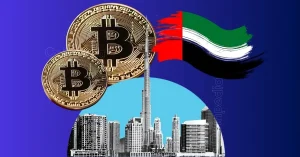Digital Money: How Does it Shape the New World Order?

Digital Money: The assumption that Central Bank Digital Currencies (CBDCs) are more reliable than stablecoins should raise some eyebrows, says International Lawyer Yaroslav K. Yarutin.
The past fifty years have dramatically reshaped the world’s socio-economic landscape. The globalist approach to the formation of social fabric is through degrees of material possession. This has solidified the status of money as an integral companion on the thorny path of evolution.
However, money itself has also evolved and undergone drastic changes. This is in both its forms and applications. It reflects fundamental shifts in its perception as a store of value in mass consciousness.
But is the financial component of society still such a firm bastion backed by the indisputable authority of the state?
The state-backed model of monetary stability was formed under the influence of the Westphalian world order prevalent in the 17th century. Most world leaders, and their subjects, still adhere to such views on money on an almost subconscious level.
Despite technological advancements, the echoes of such archaic views are reverberating even now. It can be seen in the latest iteration of money in its digital form.
Central Bank Digital Currencies
According to the Financial Action Task Force and the Basel Committee on Banking Supervision, Central Bank Digital Currencies (CBDC), a digital form of fiat money, are more reliable than stablecoins. This is solely due to the fact that the emission of CBDCs is carried out by a central bank. Not by a decentralized organization or a group of enthusiasts.
Considering the associated level of risks, the international community has developed a similar approach. The global banking watchdog stated that stablecoins involve additional risks. This is because non-state actors are behind the issuance of such coins.
Financial regulators sincerely believe that money developed by a state is more reliable. But just how reliable are such CBDCs in essence? Are they backed by any commodities or tangible assets? Or does their backing rest solely on their legal status?
Given the rampant inflation flogging fiat, and its exchange rate volatility, the assumption that CBDCs are more reliable should raise some eyebrows.
Even the global banking watchdog emphasizes that it is necessary for financial institutions and regulators “to capture the risks relating to stabilization mechanisms” of cryptocurrencies when evaluating the risk ratio.
Could stabilization mechanisms developed by a group of enthusiasts be more trustworthy than state-backed ones? They certainly could, at least from a mathematical and economical point of view.
Digital Money: Soft Laws
The aforementioned provisions do not stem from international law instruments. They come from the so-called “soft” law. The adoption of “soft” law provisions does not require full coherence by sovereign states. This is in contrast to the process of concluding international treaties or conventions. Hereby, the international community declares the uselessness of sovereign will while sculpting international regulation frameworks.
The international community has recognized virtual currencies, including stablecoins, as categories subject to international law. There is already a legal basis being prepared for the global recognition of digital currencies. By developing a legal approach, the international community is subtly calling on states to implement rules allowing the free circulation of virtual currencies on a par with fiat money.
The widespread implementation of virtual currencies is considered a harbinger of the new world order. It is characterized by the redistribution of financial sovereignty of the state among supranational entities and groups of enthusiasts.
Every individual is entitled to have their own political views, or lack thereof, and this right is immutable. Every group of enthusiasts has the right to defend their ideals, as long as they do not violate any standing laws. However, would a state advocate the concept of its sovereignty? Surprisingly, on the contrary, states are contributing in every possible way to the advent of the new world order.

Digital Money Vs Traditional
A considerable number of people and businesses across the globe are refraining from fiat money for a number of reasons. These include its non-universality, high inflationary expectations, and a heavy compliance burden.
These circumstances are obviously reducing the competitiveness of the traditional financial system. It is based on fiat money championed by the US Dollar as a global reserve currency. The latter is literally undermining its own status by becoming an instrument of political manipulation and repression in an ongoing economic type of warfare. It is leading to the destruction of civil liberties and the free exchange of value globally.
Humanity is currently in desperate need of a strictly regulated traditional financial system. And, an alternative in the form of decentralized finance that is free of redundant control, ruthless repressions, discrimination and intolerance, rampant corruption, and unfair restrictions.
To win the geopolitical race of the 21st century, states must discard the oppressive paradigm of legal prohibitions related to cryptocurrencies and blockchain-based projects.
Money should not be a restrictive instrument, but rather a uniting force for facilitating the free movement of goods and services.
The current financial system in place is just the opposite. It is a weaponized instrument of subjugation for forcefully imposing points of view.
Therefore, alternative finance is becoming the haven that blurs the boundaries between people. And, it meets the fundamental needs for the inclusive and sustainable development of all mankind.
About the author

Yaroslav K. Yarutin is an International Lawyer, and Advocate, from Moscow, Russia. His legal practice is primarily targeted at protecting the rights of crypto enthusiasts around the globe. Prior to obtaining his advocate’s license, Yaroslav has experience of project interaction with the global consulting firm on the legal issues related to AML/KYC, international tax compliance (FATCA, CRS), and insider dealing. He also has professional experience in the legal department of a major international bank. Yaroslav holds an LL.M. degree in International Law. He speaks Russian, English, and Chinese.
Got something to say about digital money or anything else? Write to us or join the discussion in our Telegram channel. You can also catch us on Tik Tok, Facebook, or Twitter.
Disclaimer
All the information contained on our website is published in good faith and for general information purposes only. Any action the reader takes upon the information found on our website is strictly at their own risk.















